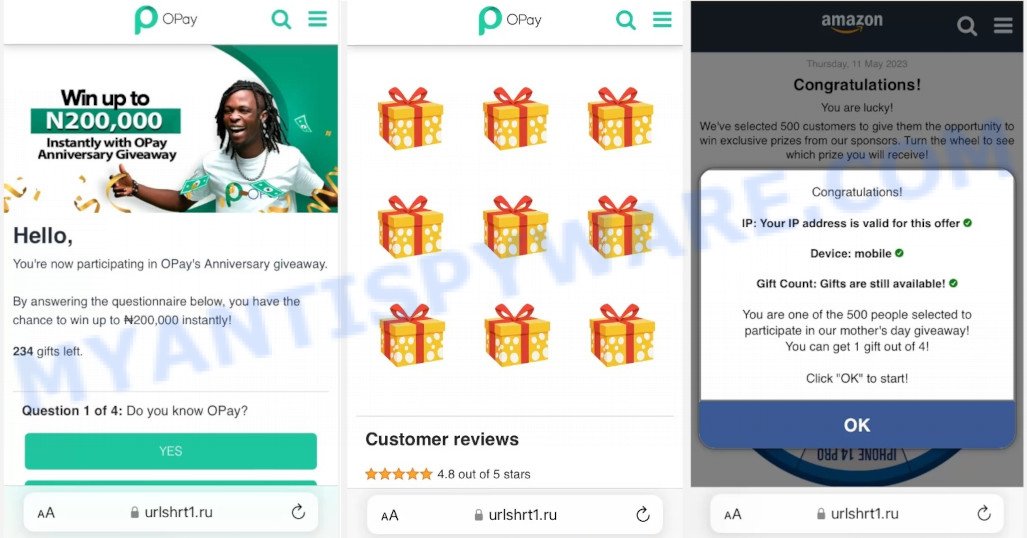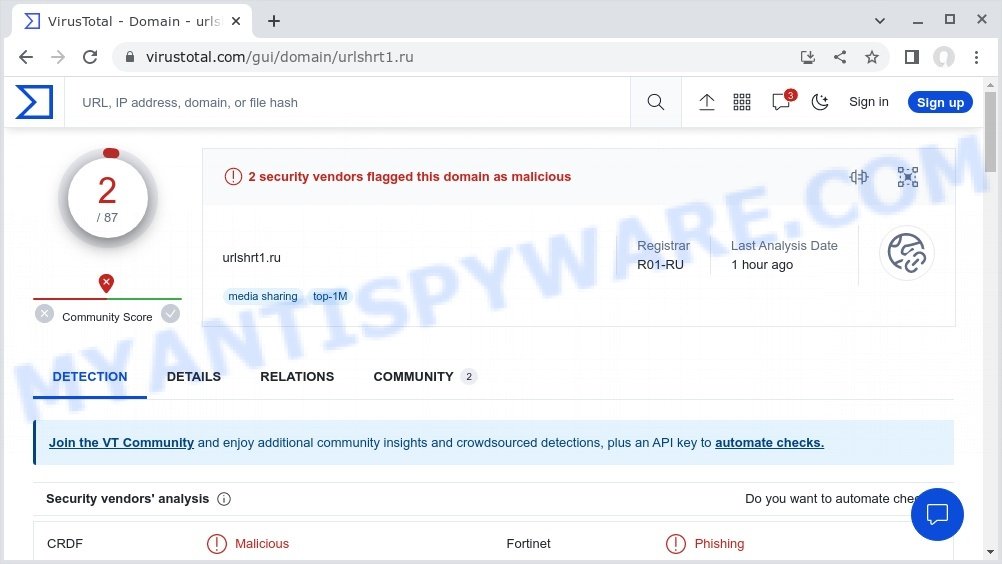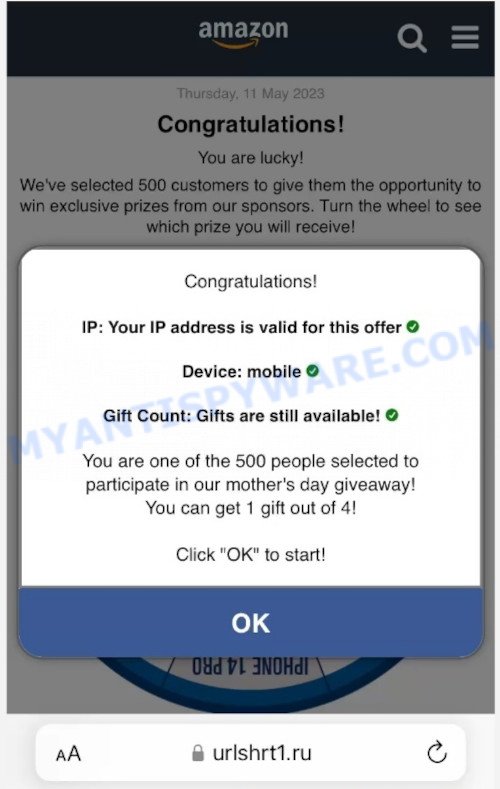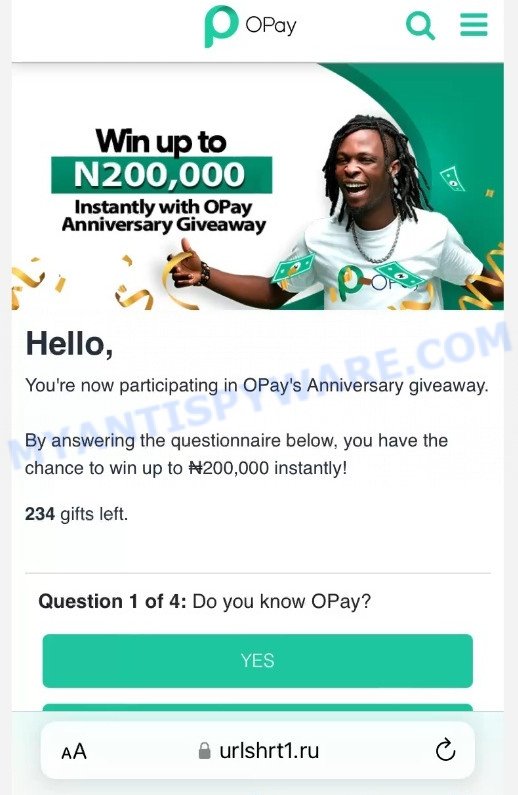The use of fake URL shorteners has become a common tactic used by scammers to deceive unsuspecting victims. Urlshrt1.ru is one such fraudulent website that pretends to be a link shortening service but instead is used to redirect people to malicious pages. The scammers behind Urlshrt1.ru have recently been targeting people through WhatsApp messages, using enticing offers and giveaways, such as those from the popular brands Amazon and OPay. In this article, we will examine the Urlshrt1.ru scam in detail, including the use of fake giveaways and the tactics used to lure people into clicking on the links.

QUICK LINKS
- Urlshrt1.ru Whatsapp Scam Explained
- Is the Urlshrt1.ru WhatsApp message a virus?
- What to do when you receive the Urlshrt1.ru WhatsApp message?
Urlshrt1.ru Whatsapp Scam Explained
The Urlshrt1.ru WhatsApp scam is a fraudulent scheme that involves the use of a fake URL shortener to deceive and defraud unsuspecting victims. The scam is initiated by sending a message via WhatsApp to individuals, which includes an enticing offer or giveaway, such as a cash prize or gift. The message usually appears to come from a reputable company, like Amazon or OPay, and claims to offer the chance to win a prize by simply clicking on a link.
VirusTotal flagged Urlshrt1.ru as malicious and phishing:

The link included in the message leads to Urlshrt1.ru, a malicious website that mimics a legitimate URL shortening service. When a victim clicks on the link, JavaScript code is triggered to perform a few checks to verify the request is coming from a mobile device, such as a smartphone. If the validation passes, the website obtains the geolocation data for the victim’s IP address and redirects them accordingly. If the validation fails, the victim is redirected to a URL that displays a 404 error.
Once the validation is successful, the victim is redirected to a page on Urlshrt1.ru that states they have the chance to receive a prize by taking a short and anonymous survey. The survey is designed to extract personal information from the victim, such as their name, email address, and phone number. Once the survey is complete, the victim is redirected to a page containing a form that they must fill out with their personal data.
The scammers behind Urlshrt1.ru use the Chain-letter method to spread scam messages through WhatsApp, making it more likely for people to fall for the scam as it appears to come from a trusted source. It is important to note that legitimate companies do not typically offer gifts or cash prizes in exchange for filling out surveys, and people should exercise caution when clicking on links received via unknown sources.
In one variant of the Urlshrt1.ru scam, scammers send WhatsApp messages to potential victims, claiming that they have been selected to win a prize from Amazon. The message typically includes a link to a website hosted on Urlshrt1.ru, where the victim is instructed to spin a wheel or answer a short survey to claim their prize. However, the website is actually a fake URL shortener designed to redirect victims to fraudulent pages. Once the victim completes the survey, they are asked to provide personal information, such as their name, email address, and phone number, which the scammers can use for further fraudulent activities.

Another variant of the Urlshrt1.ru scam involves using the OPay brand to lure victims into clicking on a link. The scam message claims that the victim has been selected to participate in OPay’s Anniversary giveaway and can win up to N200,000 instantly. The message instructs the victim to answer a questionnaire by clicking on a link to a website hosted on Urlshrt1.ru. The website claims to be a legitimate survey site and promises the chance to win a prize upon completion. However, once the survey is complete, the victim is asked to provide personal information, which the scammers can use for fraudulent activities. This variant of the scam also uses the fake URL shortener to redirect victims to fraudulent pages, and the scammers use the data collected from the survey to defraud their victims.

In some cases, the scam may require the victim to fill out a form with personal information in order to receive the supposed gift. For example, the Urlshrt1.ru site instructs the victim to fill out a form in order to receive their gift. The form is accessed by clicking on the ‘FINISH’ button, which the site claims is a required step in order to receive the gift.
Here’s a step-by-step breakdown of how the Urlshrt1.ru WhatsApp scam works:
- The scammer sends a message via WhatsApp to a potential victim, often using an enticing message such as “Congratulations, you have won a prize from Amazon!” or “Answer a short survey and win a prize from OPay!”
- The message includes a link to a website hosted on Urlshrt1.ru, which appears to be a legitimate URL shortener site. However, this site is actually fake and designed to redirect the victim to a fraudulent page.
- When the victim clicks on the link, JavaScript code on the website checks whether the request is coming from a mobile device, such as a smartphone.
- If the request comes from a mobile device, the website obtains geolocation data for the victim’s IP address and redirects the victim to a fraudulent page based on their location. If the request does not come from a mobile device or geolocation data cannot be obtained, the victim is redirected to a URL which displays a 404 error.
- Once the victim is redirected to the fraudulent page, they are presented with a message that claims they have been selected to win a prize from a well-known company, such as Amazon or OPay. The message may instruct the victim to spin a wheel or answer a short survey to claim their prize.
- To receive the prize, the victim must complete two additional steps. First, they are asked to share the promotion with their WhatsApp groups and friends until a blue bar is filled up. This is designed to help the scam go viral and reach more potential victims. The victim is often required to share the promotion with at least 5 groups or 20 friends.
- Second, the victim is asked to provide personal information, including their delivery address, which is used to steal their identity or sell to other scammers.
- The victim may also be asked to pay a shipping fee to claim their prize. However, even if people pay the fee, they will not receive anything in return.
Overall, the Urlshrt1.ru WhatsApp scam is a sophisticated phishing scam that preys on people’s desire to win prizes or receive gifts. By using fake URL shorteners and well-known company brands as bait, scammers are able to trick victims into providing their personal information, which can then be used for fraudulent activities.
Is the Urlshrt1.ru WhatsApp message a virus?
No, the Urlshrt1.ru WhatsApp message itself is not a virus. However, the link included in the message may redirect the victim to a website that contains malware or other malicious content, which can harm the victim’s device or compromise their personal information.
To avoid falling victim to the Urlshrt1.ru WhatsApp scam, it’s important to be cautious when receiving unsolicited messages and to avoid clicking on any suspicious links. If you receive a message from an unknown sender or a sender claiming to be a well-known company, always verify the identity of the sender and the legitimacy of the message before taking any action.
If you receive a suspicious message from a scammer, you can block the sender on WhatsApp to prevent them from contacting you again. To block a sender on WhatsApp, simply open the chat with the sender, tap on their name or phone number, scroll down to the bottom of the screen, and tap on “Block”. You can also report the message as spam or abuse by tapping on the “Report” option in the menu. This will help WhatsApp to identify and take action against malicious actors who engage in fraudulent activities on the platform.
Examples of such scams
As with most scams, the Urlshrt1.ru WhatsApp scam is just one example of many similar schemes that aim to trick unsuspecting victims into giving away personal information or falling victim to malware. These types of scams often use tactics such as offering prizes or gifts, using familiar brand names, and creating a sense of urgency or excitement to encourage victims to act quickly without thinking. Below we’ll highlight a few examples of these scams to help you stay informed and avoid falling victim to them.
Here are a few links to examples of similar scams: Wa5.ru Scam, Urltiny.ru Scam, and Wa8.ru Scam.
Always be wary of WhatsApp messages that offer prizes or ask for personal information, and if you’re not sure if a message is legitimate, do some research or contact the company directly to verify.
- PhonePe Giveaway Scam
- Cadbury Easter Egg Hunt Scam
- Wa5.ru WhatsApp Scam Roblox Giveaway
- Amazon Childrens Day PlayStation 5 Giveaway Scam
- Capitec Giveaway WhatsApp Scam
What to do when you receive the Urlshrt1.ru WhatsApp message?
If you receive a WhatsApp message with an Urlshrt1.ru link, it is recommended that you do not click on it. This is especially true if the message came from an unknown sender or if the sender is not someone you know and trust. If the message came from a friend or relative, it is still important to exercise caution and verify the authenticity of the message before clicking on any links.
If you have already clicked on the link and provided any personal information, you should take immediate steps to protect yourself from potential identity theft or financial fraud. This includes monitoring your bank and credit card accounts for any suspicious activity, changing your passwords, and contacting your financial institutions to alert them of the potential breach. You may also want to consider placing a fraud alert or credit freeze on your accounts to prevent any unauthorized access. Use the steps (https://consumer.ftc.gov/articles/what-do-if-you-were-scammed) to try to stop a transaction, get a transaction reversed, or get a refund.
Additionally, you should report the message to WhatsApp by tapping and holding on the message, selecting “Report”, and choosing the appropriate reason for the report. This will help WhatsApp to identify and take action against any accounts involved in spreading the scam.
Finally, you can take proactive measures to protect yourself from similar scams in the future by enabling two-factor authentication on your WhatsApp account, avoiding clicking on links from unknown or untrusted sources, and keeping your device’s operating system and antivirus software up to date.
Threat Summary
| Name | Urlshrt1.ru WhatsApp Scam, “Urlshrt1.ru spam”, “Urlshrt1.ru virus” |
| Type | Phishing Scam |
| Fake claims | Offers fake prizes such as gift cards, smartphones, and laptops |
| Damage | Identity theft, financial loss, malware infection |
| Distribution methods | Spread via WhatsApp messages, often from trusted contacts (friends and family members) |
| Prevention Tips | Don’t click on suspicious links, be wary of unsolicited messages offering prizes or gifts, verify information with the brand directly, do not forward the message to others, use antivirus software and keep it up-to-date |
| Reporting Info | Report the message to WhatsApp by selecting “Report” within the message or contact local authorities if you have fallen victim to the scam. |
Conclusion: Staying Safe from Urlshrt1.ru WhatsApp Scam and Similar Scams
As the Urlshrt1.ru WhatsApp scam and similar scams continue to proliferate, it’s important to stay informed and vigilant to protect yourself and others from falling victim. While scammers may constantly modify their tactics and use different brands or messages to lure people into clicking malicious links, there are steps you can take to avoid becoming a victim. In this final section, we’ll provide some practical tips to help you stay safe and report any suspicious activity you encounter.
Some general tips for staying safe from these types of scams include:
- Be wary of unsolicited messages or emails that offer prizes, ask for personal information, or contain suspicious links.
- Don’t click on links from unknown senders or that seem too good to be true, and always verify the URL before clicking.
- Never provide personal or sensitive information in response to a message, especially if it’s from an unknown sender.
- If you receive a suspicious message, report it to WhatsApp immediately so they can take action.
- Keep your software and security systems up to date to help protect against malware and other threats.
- Use strong, unique passwords for your accounts, and enable two-factor authentication wherever possible.
- Enable two-factor authentication. This will add an extra layer of security to your WhatsApp account and make it harder for scammers to gain access.
- Keep up-to-date with the latest scams and tactics used by scammers so you can be more aware and better prepared to avoid them.
By taking these steps, you can help prevent cybercriminals from stealing your personal information or money. Remember, if something seems too good to be true, it probably is!






















